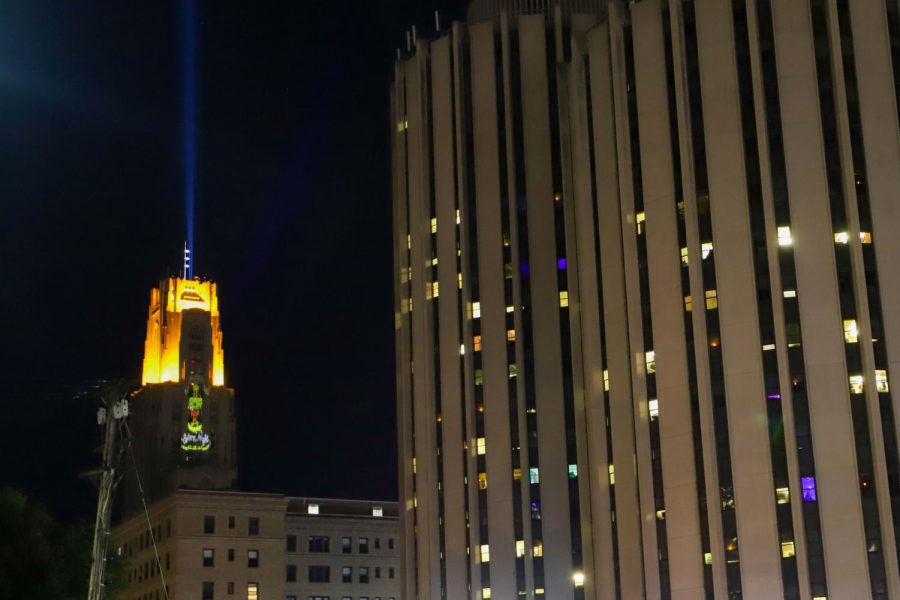Students celebrate 100th Lantern Night from a distance
Sarah Cutshall | Visual Editor
First-year students were given LED lanterns to display in their windows to celebrate the 100th annual Lantern Night.
August 21, 2020
Unconventional times don’t necessarily call for disregard of tradition, especially in the case of Pitt’s annual Lantern Night held this week.
Lantern Night, one of Pitt’s oldest traditions, celebrated its 100th anniversary this year. The event, which welcomes first-year female students as they begin their time at the University, typically occurs inside Heinz Chapel, where alumni can pass the light of learning — both literally and metaphorically — to the younger generation.
Due to the COVID-19 pandemic, this year looked quite different as first-year students placed LED candles in their dorm windows and watched the Cathedral of Learning illuminate with a graphic honoring the tradition on Tuesday at sundown. Alumni also posted words of encouragement for first-years online.
Selam Gillett, a first-year psychology major, said she wished the University had been more proactive in communicating their plans for the ceremony and had taken efforts in utilizing technology to connect students.
“I was really looking forward to the full experience, and I feel like I missed out,” Gillett said. “I definitely would have tried to make the event more interactive, whether that meant asking girls to stand six feet apart outside on the Cathedral lawn, or even allowing us to submit a video of ourselves wearing white and holding our lanterns.”
Mary Elain Devlin, a 2008 alumnus, encouraged female students not to let current circumstances dissuade them from their goals.
“I know we are living in unique times due to the pandemic, the focus on equality and volatile economic times,” Devlin said. “However, this long and honorable Pitt tradition symbolizes that you will carry the light to accomplish whatever you set your sights on. You symbolize the journey that women have taken throughout the centuries and in history to accomplish many great achievements.”
Lantern Night going remote wasn’t the only change made to this year’s event. Pitt made the decision to include male first-year students in the festivities this year — a new choice inspired by efforts to create a more inclusive environment at Pitt.
Nancy Merritt, the vice chancellor for alumni relations, said although embracing women in education remains a core value, the pandemic has presented them with a unique opportunity. Going forward, the Lantern Night ceremony will extend to all Pitt students regardless of gender.
“If there are any positives to this pandemic, it’s that we’re actually able to be more inclusive than we have in the past,” Merritt said. “While women-to-women support remains important, we want to focus on equity and justice for minoritized populations and reshape tradition so that the core spirit can always be carried through.”
The ceremony looked a lot different last year for Ellie Cook, a sophomore history and psychology major.
“Lantern Night was a really special opportunity to see all the first-year women come together and celebrate the rising status and importance of women in education,” Cook said. “It’s important we continue this tradition, as it is symbolic of the next generation of influential women.”
Cook said education has always been one of the most important aspects of her childhood. She said she values her experience in last years’ Lantern Night ceremony, as she was able to share the tradition with her late grandmother, who graduated from the Dietrich School of Arts and Sciences in 1958 and the School of Social Work in 1977.
Although not traditional, the addition of male students created some controversy among students, including Cook, who worry the meaning of Lantern Night will be lost.
“Lantern Night was created at a time when education was not readily available to women, and for Pitt to honor and empower educated women is really amazing,” Cook said. “But even in today’s world, educated women still face challenges — especially those in STEM fields. Allowing boys to take part in our tradition takes away from the purpose and meaning of the Lantern Night ceremony.”
Tom Staunton, a first-year chemistry major, said he was happy to show his support in the traditionally all-female ceremony.
“I think it’s really great that all the male students were able to support our female classmates,” Staunton said. “Especially in a pandemic, it really shows how we truly are one student body.”
Alexis Wehrle, a first-year business major, had lower expectations given the seriousness of the pandemic. She expressed appreciation for the University’s attempts to give the class of 2024 a chance to experience the tradition, and was positive about the University’s inclusion of male students.
“Lantern Night is important to me, as my mother participated in the ceremony as an undergraduate at Pitt,” Wehrle said. “I think it’s really important that they didn’t discard the tradition, but instead did everything in their power to keep it alive this year.”








